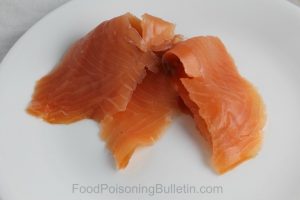There have been several recalls of smoked salmon for Listeria monocytogenes contamination in the past several weeks. There is zero tolerance for only two bacteria in ready to eat foods such as smoked salmon: Listeria and Salmonella. These are foods that are processed in some way, but are eaten without reheating.
 So why is smoked salmon, more specifically cold smoked salmon, susceptible to bacterial contamination? The FDA has specified processing parameters that are necessary to control pathogenic bacteria presence in smoked fish. Listeria monocytogenes is widely distributed in the environment and occurs naturally in many raw foods. It is present in water bodies; prevalence in river, seawater, and spring water varies from 0 to 62%. Runoff from agricultural areas is associated with the higher numbers. Therefore, it is present in salmon harvested in U.S., Norwegian, Chilean, and Canadian waters.
So why is smoked salmon, more specifically cold smoked salmon, susceptible to bacterial contamination? The FDA has specified processing parameters that are necessary to control pathogenic bacteria presence in smoked fish. Listeria monocytogenes is widely distributed in the environment and occurs naturally in many raw foods. It is present in water bodies; prevalence in river, seawater, and spring water varies from 0 to 62%. Runoff from agricultural areas is associated with the higher numbers. Therefore, it is present in salmon harvested in U.S., Norwegian, Chilean, and Canadian waters.
A study at the Colorado State University Extension Service that was published in 2008 provides more answers. There are several factors that play into contamination, including how the salmon is held, draining, brining, the smoking temperature, cooling, and packaging of the product. All of these factors are called “critical control points”, where contamination is possible unless the steps are followed perfectly and correctly.
Salmon meant for cold smoking should be purchased frozen to reduce parasite contamination. Brining the salmon must be conducted with fresh brine for each batch to avoid cross-contamination. The fish must be properly drained after brining and before introduction to the smoker. During the smoking process, the fish must be of the same size and shape so they dehydrate at the same rate. The cold smoking temperatures only reach 90 degrees F, which is not high enough to kill bacteria that may be present. Manufacturers of cold smoked salmon can use CO2, nitrates, and other preservatives to help eliminate bacteria on the salmon.
Another study conducted by the University of British Columbia found that Listeria monocytogenes was present in 20% of ready to eat fish products sold in Vancouver, British Columbia. The products tested included lox (cold smoked salmon), fish jerky, smoked tuna, and candied salmon. Once the fish is contaminated, the bacteria present on the fish can easily multiply in the food while it’s being shipped and while it’s on store shelves, even at refrigerator temperatures.
Because of these issues, public health officials recommend that anyone in a high risk group avoid cold smoked salmon. That includes pregnant women, the elderly, the very young, those with compromised immune systems, and those with chronic illnesses. The risk is just too great, and Listeria infections can be deadly.




